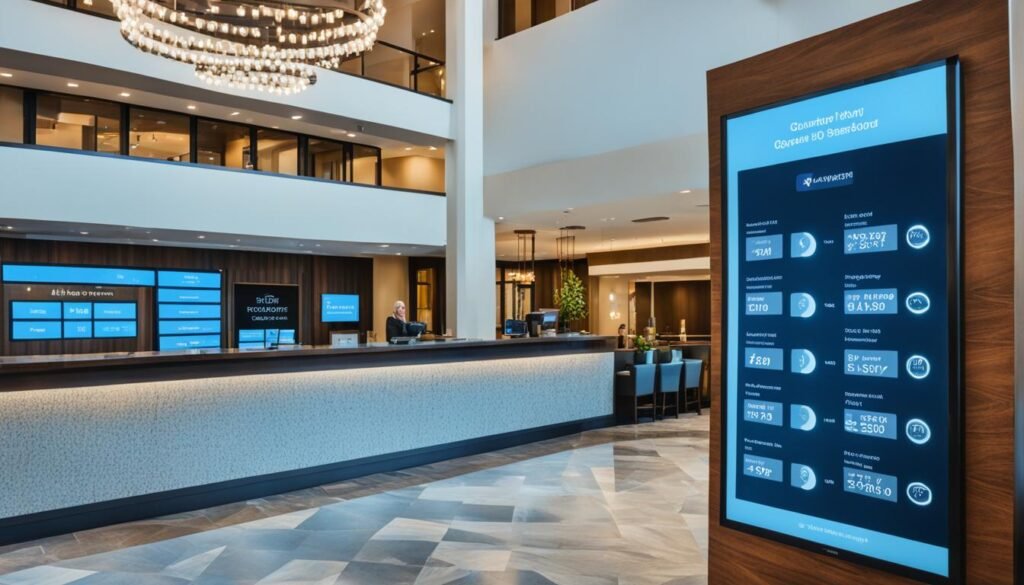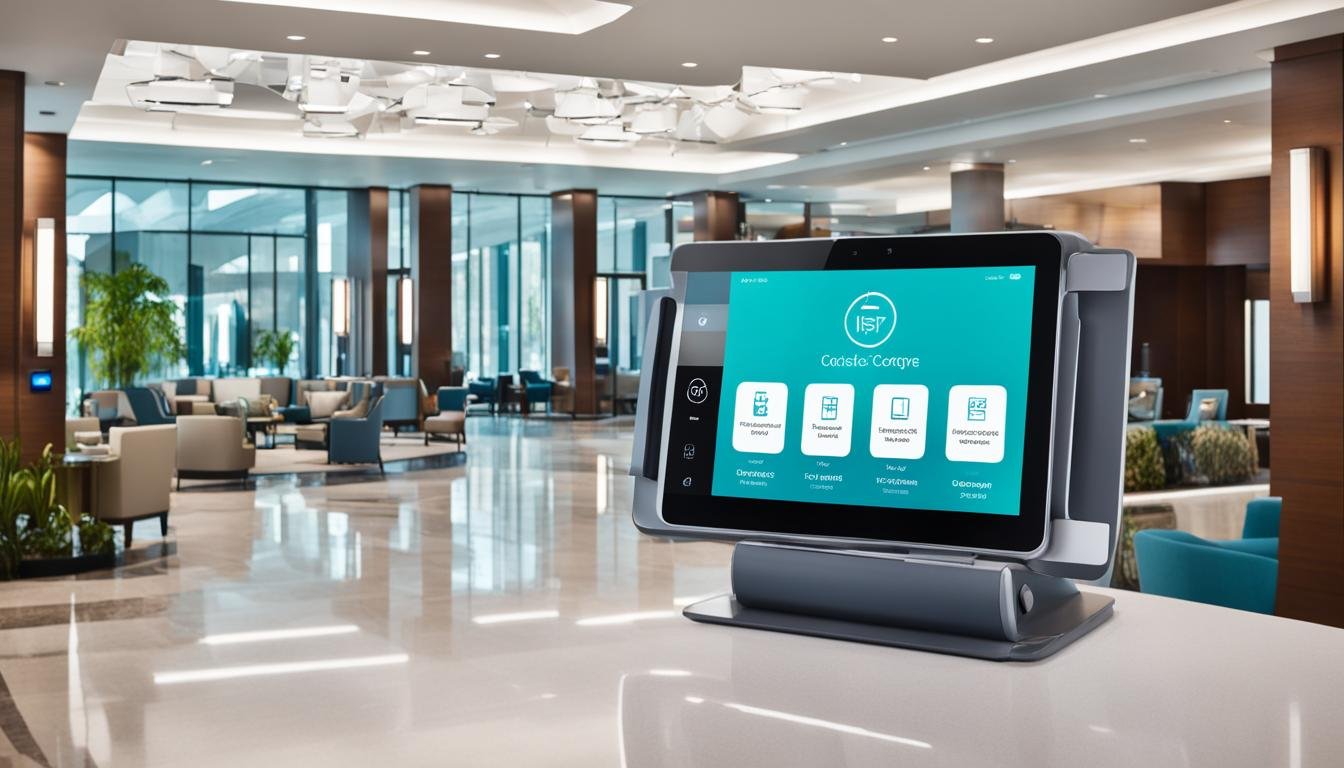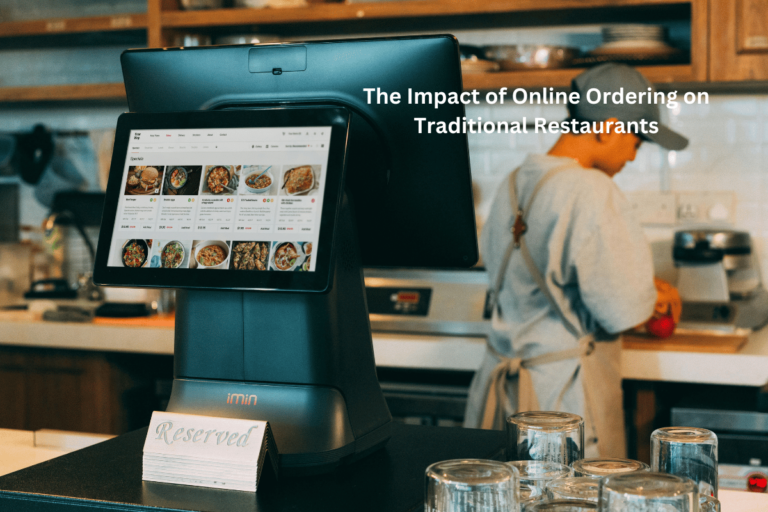Hospitality Tech Essentials: An Introduction
Imagine planning your dream vacation to a resort in the mountains. You’re excited for a getaway that will relax and refresh you. You start looking through various hotels online, fascinated by their amenities and stunning views.
While searching, you come across beautiful images, engaging videos, and glowing reviews. The entire process, from selecting a hotel to booking, is smooth and easy.
This amazing experience is all thanks to hospitality technology. In the digital age, advancements in tech are changing how hotels work, connect with guests, and provide memorable stays.
Let’s start our journey into the world of hospitality technology. We’ll look at the newest trends and the essential tech tools for hotels. We’ll also see how these technologies benefit both the establishments and their visitors. Using technology is key for hotels to offer outstanding service and keep up in today’s market.
Key Takeaways:
- Technology is shaping the future of the hospitality industry. It’s crucial to keep up with the latest trends.
- A solid hotel tech stack includes important items like a property management system and an online booking engine. It also has mobile integrations and an analytics system.
- By using hospitality technology, hotels can operate more smoothly, be more efficient, and create better guest experiences. This can also lead to higher revenue.
- The future of hospitality technology looks promising with AI, the internet of things, VR, and AR. These technologies may further improve the guest experience.
- But, there are challenges to face when implementing new technology in the hospitality industry. Hotels need to deal with these strategically.
The Essential Components of a Hotel Tech Stack
It’s key for hotels to have a strong tech setup for smooth operations and happy guests.
There are many important tech tools for hotels to use. Every hotel should think about adding these to their systems:
1. Property Management System (PMS)
A PMS is like the heart of a hotel, managing check-ins, check-outs, rooms, guest likes, and payments. Having a good one helps hotels run well and offer top-notch service.
2. Online Booking Engine
The online booking engine lets hotels get more direct bookings, reducing the need for other sites. It makes booking rooms and services simple for guests on the hotel’s website. This boost in convenience can lead to more bookings for the hotel.
3. Revenue Management System
This system helps hotels smartly set prices to earn more. It looks at what customers want, the market, and what competitors offer. This way, hotels can price rooms just right, making the most from their sales.
4. Analytics
Analytics give powerful data about guests, which is very helpful. They help hotels understand what guests like and what sells. With this insight, hotels can make better choices, market well, and make stays feel more personal.
5. Mobile Integrations
Mobile friendliness is a must, as it makes guests’ lives easier. Features like mobile check-in, keyless entry, and in-app help make stays smooth and tailored. Hotels also use this to chat with guests, offer special deals, and get input on how to do better.
6. Central Communication System
With a system for all staff to talk through, hotels run smoother. It keeps everyone up-to-date and able to quickly handle guest needs. Without it, hotels might not work as well or offer as great an experience.
It’s essential for hotels to build a tech stack with these core pieces for success in today’s tech-centered world.
Choosing the right tech can help hotels work better, offer tailored services, manage money smarter, and make guests happier.
In our next part, we’ll look at how hotel tech changes the game for the whole industry.
The Benefits of Hospitality Technology
Hospitality technology is a game-changer for hotels and their guests. It lets hotels use automation and customization to run better and make guests happier. Discover how using this tech can make a big difference in your hotel.
Streamlined Operations and Improved Efficiency
By bringing in new tech, hotels can cut out manual work and speed up what they do. Things like automatic check-ins and keys that don’t need physical copies are part of it. There are also self-help machines that make everything work more smoothly. This means less chance of mistakes. It also means that the staff can be more available to help guests.
Enhanced Guest Experience
Technology changes everything for the guest, too. Apps, tablets, and virtual help are all at your fingertips now. They let guests do things like book a table, order some food, or find out about the area without having to ask anyone. These changes make guests feel special and well looked after.
Increased Revenue
Tech can also help hotels make more money. With better ways to book rooms and decide on prices, hotels can fill up more. They can also tailor their offers to what guests want, which can mean more money in the end.
Competitive Advantage in a Evolving Industry
In a world where hotels are always trying to outdo each other, being sharp on technology can put you ahead. It’s not just about having the newest toys. It’s about making sure the guests are happy with what you can do for them. Staying on top of tech trends can help draw in guests looking for that wow factor.
Overall, using technology in hospitality is a win-win. It makes things run smoother, pleases guests more, and helps the bottom line. Keeping up with new tech can make your hotel stand out and keep guests coming back for more.
The Future of Hospitality Technology
Technology is moving forward, changing hospitality significantly. Innovations such as Artificial Intelligence (AI), Internet of Things (IoT), Virtual Reality (VR), and Augmented Reality (AR) are about to shake up how hotels work and serve guests.
Artificial Intelligence (AI) can make guest experiences better by giving personal tips and controlling rooms smartly. With AI chatbots and virtual helpers, hotels can quickly answer questions, speed up check-ins and check-outs, and make stays extra special based on guest likes.
The Internet of Things (IoT) is all about smart devices working together. It lets hotels automate things, watch energy use, and offer tailored services. Guests enjoy perks like setting their room how they like it, making everything more comfortable and easy.
Virtual Reality (VR) and Augmented Reality (AR) can bring a whole new feel to staying at a hotel. VR lets hotels show off with virtual tours, giving people a preview before they book. AR adds cool, real-time info and touches within the hotel.
“The future of hospitality technology lies in leveraging AI, IoT, VR, and AR to offer seamless and immersive experiences for guests.”
New tech means hotels can give personal service, guess what guests want, and make memories that last. It’s all about working smarter, pleasing guests more, and doing better in a crowded market.
| Emerging Technologies | Key Benefits |
|---|---|
| Artificial Intelligence (AI) |
|
| Internet of Things (IoT) |
|
| Virtual Reality (VR) |
|
| Augmented Reality (AR) |
|
The future of hospitality tech is full of amazing opportunities for hotels to wow their guests. By using these new technologies, hotels can create smooth, immersive spaces that meet their guests’ changing needs and expectations.
Overcoming Challenges in Implementing Hospitality Technology
Adding hospitality technology brings lots of good things to hotels. But, it’s not all easy. Hotels face big tests to use tech well. They must beat these challenges to win. Here’s what hotels might bump into:
Building a Hotel Tech Stack
Getting the right tech mix is tough. Hotels need technologies that match what they need. They pick from systems like booking engines to communication tools. Everything in a hotel’s tech pack must work well together.
Choosing the Right Vendors
It’s hard to find trustworthy tech vendors. Hotels must look hard at many vendors. This ensures the products and support are top-notch. Picking the right vendors is key for smooth and efficient tech use.
Adapting to New Technology
Learning new tech isn’t always easy for staff. They might not like the change. But, with the right training, they can see how tech helps. This makes work better for everyone.
Seamless Integration
Making different systems work together can be tricky. If systems don’t talk, things can go wrong. Working closely with vendors is crucial. It helps make everything run without a hitch.
Data Security and Privacy
Data safety is now a big deal with tech use. Hotels must protect guest info and follow the rules. They need top-notch security. Staying up-to-date with security keeps everything safe.
Finding the Right Balance
Combining tech and human care is tricky. Too much tech can make things cold. But too little means lost opportunity. The best hotels mix cool tech with people’s warmth for guests.
Tackling these challenges is a step towards better tech use. It needs planning, training, good partners, and a focus on guests. With this, hotels can welcome tech with open arms.
The Role of Cloud-Based Systems in Hospitality Technology
Cloud-based systems are changing how hotels work, offering flexibility and efficiency. They allow hotel managers to control everything from any place. This makes running a hotel easier and more convenient than ever before.
Flexibility and Scalability
These systems can adjust easily to a hotel’s size and needs. Whether the goal is to grow or just add new features, it’s simple with cloud technology. It keeps hotels competitive in a fast-changing market.
Accessibility and Mobility
Being able to work from anywhere is a big plus. With an internet connection, staff can keep an eye on things or make updates using any device. This means better teamwork and control, no matter where the team is.
For guests, cloud systems make things smoother, from booking online to checking in. They meet the high expectations of today’s travelers.
Reduced Reliance on Vendors
Cloud tech also means hotels can handle more tech stuff themselves. They don’t need as much help from outside companies. This includes setting room prices, updating food menus, and making guests’ stays more personal.
“Cloud-based systems offer hotels the ability to scale their operations rapidly while providing seamless access to critical data and processes.” – Hotel Tech Magazine
With cloud systems, hotels can pick what works best for them. This ensures their tech helps meet their business goals.
The Future of Cloud-Based Systems
Cloud tech is only going to get more important for hotels. New tech like AI and machine learning will make cloud systems even better. They’ll help hotels offer even more personal and guest-focused experiences.
Using cloud systems, hotels can keep innovating and lead the way in hospitality technology.
Prioritizing Technology Implementation in Hotels
Choosing the right tech for hotels is key. Each hotel has its unique needs. They should pick and use tech that helps their business and makes guests happy.
Using tech like integrated payment terminals is important. They make paying easier and more secure for guests. This makes the process smoother for everyone involved.
Guest engagement is also vital. These tools let hotels give personalized experiences to guests. This makes guests happier and more likely to return.
“Guest engagement tools enable hotels to deliver personalized experiences, anticipate guest needs, and build strong, long-term relationships with their guests.”
Don’t forget about managing a hotel’s online reputation. What guests say online really matters. Handling comments can help a hotel keep a good image.
It’s crucial to pick tech that can grow and change with a hotel. Technology moves fast. Hotels need tech that won’t become outdated quickly. This keeps them prepared for the future.
Hotel Tech Prioritization Checklist:
- Integrated payment terminals
- Guest engagement tools
- Reputation management systems
- Scalable and adaptable tech solutions
Choosing tech that suits a hotel’s needs is very important. Integrated payment terminals, guest engagement tools, reputation management, and adaptable tech are top choices. They help hotels succeed in tech-driven hospitality.
Leveraging Data and Analytics in Hospitality Technology

Data and analytics are critical in the hospitality tech world. They help hotels learn a lot about guest behavior. This knowledge improves how hotels operate and track their success. This part will look at how data analytics boost success in the hospitality industry.
Understanding Guest Behavior through Data Analysis
Data analysis helps hotels know more about what guests like. They look at booking info, social media, and guest feedback. This gives hotels ideas about what guests want.
Using this, hotels can make their services better match guest needs. They may suggest personalized room features or local places to visit. This boosts guest satisfaction and loyalty.
Ongoing Performance Metrics for Continuous Improvement
Data and analytics help hotels keep track of how they’re doing all the time. They look at things like how full the hotel is, how much money they make per room, and the room rate. This shows them where they can be better.
Real-time data lets hotels make improvements quickly. For example, if fewer guests are coming, they can use data to find ways to bring more guests in.
Optimizing Revenue Management Strategies
Hotels use data to figure out when people are most likely to book. They adjust prices to match these trends.
At busy times, hotels can change prices for more profit. They use data to see what prices have worked in the past. This can include offering special rates or deals.
With data analytics, hotels can make sure they’re making as much money as they can.
In an industry as competitive as hospitality, data and analytics are no longer just complementary tools; they are essential for success. By understanding guest behavior, monitoring performance metrics, and optimizing revenue management strategies, hotels can stay ahead of the curve and deliver exceptional guest experiences.
To show how important data analytics are, let’s check out some key business numbers:
| Metric | Definition | Example |
|---|---|---|
| Occupancy Rate | The percentage of available rooms that are occupied | 80% |
| RevPAR (Revenue Per Available Room) | Total room revenue divided by the number of available rooms | $100 |
| ADR (Average Daily Rate) | Total room revenue divided by the number of rooms sold | $120 |
| Revenue Conversion | The percentage of website visitors who make a booking | 5% |
Through analytics, hotels find ways to do better and make more money. They also improve the guest experience.
Good data analytics tools help hotels use their data well. They turn insights into action, leading to success in the techy world of hospitality.
Enhancing Guest Experiences with Hospitality Technology
Hospitality technology is key in making guests feel special. With advanced tools, hotels exceed what guests expect, making their stay memorable. Let’s look at how technology does this.
1. Personalized Services
Hospitality technology lets hotels give specific services to each guest. They can use data to learn what each guest likes. They can then offer things like special room setups or personal recommendations. This makes each guest’s experience unique and unforgettable.
2. Seamless Mobile Integrations
Today, mobile devices are vital for a good guest experience. Technology allows for mobile check-in, keyless entry, and more. This reduces waiting and adds convenience for guests. This makes their stay smoother and more enjoyable.
3. Virtual Assistants
Virtual assistants are changing how guests communicate with hotels. These AI-powered systems answer questions quickly, give tips, and can even take room service orders. They make hotel services fast and smart, improving the guest experience.
4. Efficient Online Reviews Management
Reviews online shape a hotel’s image. With technology, hotels can handle reviews well, quickly addressing any concerns. This interaction helps keep guests happy and improves the hotel’s reputation.
“Hospitality technology enables hotels to personalize services, provide seamless experiences, and effectively manage online reviews, enhancing the overall guest experience.”
Hospitality technology lifts guest experiences to a new level. It does this through personal services, digital mobile features, AI helpers, and efficient reviews handling. These advancements allow hotels to really connect with their guests. They foster loyalty and make lasting impressions. Now is the time for hotels to embrace new technology and create unforgettable stays!
The Importance of Upselling in Hospitality Technology
Upselling is key for any hotel wanting to boost their income. Hotels can make more money per guest by using upselling and cross-selling. This strategy means guests get to choose from upgrades, add-ons, or unique services. This personal touch can make guests happier, while also adding to the hotel’s profits.
Hotels use special tools to customize their offers for each guest. This makes the guest’s experience feel special. They might be tempted with a better view, spa treatments, or extra amenities that make their stay memorable.
The Benefits of Upselling Tools
- Increased Ancillary Revenue: Using upselling tools means hotels can make money from more than just the room. By offering exciting extras, they encourage guests to spend more, boosting the hotel’s earnings.
- Enhanced Guest Satisfaction: These personalized upgrades delight guests, exceeding their expectations. This leads to happier guests and better reviews.
- Customer Loyalty and Repeat Business: Happy guests are more likely to come back and recommend the hotel. This turns into increased loyal customers and free marketing through positive word of mouth.
To upsell well, hotels need to understand what guests want. They use data and analysis to find the best upselling chances. With this insight, they can offer the perfect upgrades and boosts to their guests, improving their success rate.
“Effective upselling techniques are crucial for hotels looking to maximize their revenue potential while providing exceptional guest experiences. By utilizing upselling tools, hotels can enhance profitability, guest satisfaction, and long-term loyalty.”
In the field of hospitality technology, upselling is a game-changer. Armed with the right knowledge and tools, hotels can earn more, keep their guests happy, and stand out in the crowd. This approach helps hotels reach their revenue goals and shine even in a tough market.
Conclusion
Hospitality technology is key for hotels today. It brings many benefits and shapes the industry’s future. With the right tech, hotels can make things smoother, delight guests, and lead the pack.
It’s vital for the industry to keep up with tech trends. This means using new tools like AI and virtual reality. These innovations allow hotels to give customers tailored experiences and amazing settings.
Staying ahead also means choosing tech wisely. By using data and analytics, hotels learn more about their guests. This info helps with managing better and making more money. Plus, tech can make stays more personal and easy, which keeps guests happy and spending more.
FAQ
Q: What is hospitality technology?
A: Hospitality technology uses digital tools to make running hotels easier. It improves guest visits and helps make more money. It’s all about using the latest digital systems in the hotel business.
Q: What are the essential components of a hotel tech stack?
A: A hotel tech stack needs key tools. These tools include a PMS, a booking engine, a revenue system, and analytics. They also need mobile apps and a central way for all systems to talk to each other.
Q: What are the benefits of hospitality technology?
A: Hospitality tech means things run smoother. Guests have better visits. It also means hotels can earn more money and offer special services to their guests.
Q: What is the future of hospitality technology?
A: The future of hotel tech looks exciting. New tech like AI, IoT, and VR is changing everything. Soon, we’ll see big changes in how hotels work and how guests are looked after.
Q: What are the challenges in implementing hospitality technology?
A: Setting up new tech in hotels can be tough. You need to plan carefully and pick good partners. It’s also important to train your staff well and make sure all your systems work together smoothly.
Q: What is the role of cloud-based systems in hospitality technology?
A: Cloud systems are very important for hotels. They bring flexibility and make things scalable. They reduce the need for lots of paperwork and make it easier to manage things without depending too much on others.
Q: How should hotels prioritize technology implementation?
A: Hotels should pick tech that helps them make more money. This includes things like easy payment options for guests and tools that keep guests happy and improve the hotel’s reputation.
Q: How can data and analytics be leveraged in hospitality technology?
A: Data can help hotels understand their guests and how well the hotel is running. With this information, they can make smart choices to run the hotel better. They can also better manage how they charge for rooms and services.
Q: How can hospitality technology enhance guest experiences?
A: Tech can make guests’ lives easier. Things like mobile apps and online check-ins save time. They can also help hotels keep a good reputation online by managing reviews and quickly responding to feedback.
Q: Why is upselling important in hospitality technology?
A: Upselling helps hotels make more money. It involves offering guests extra services or upgrades. This is a smart way for hotels to increase how much they earn from each guest’s stay.







